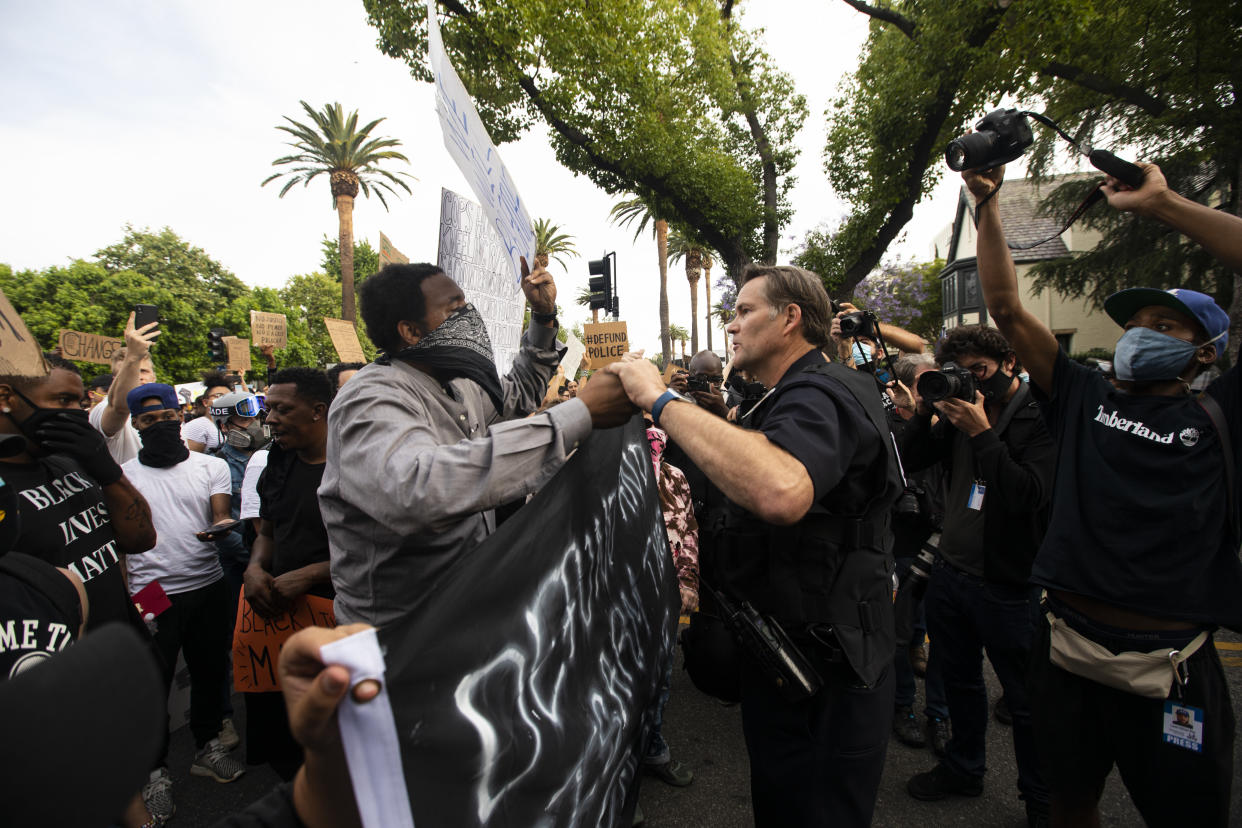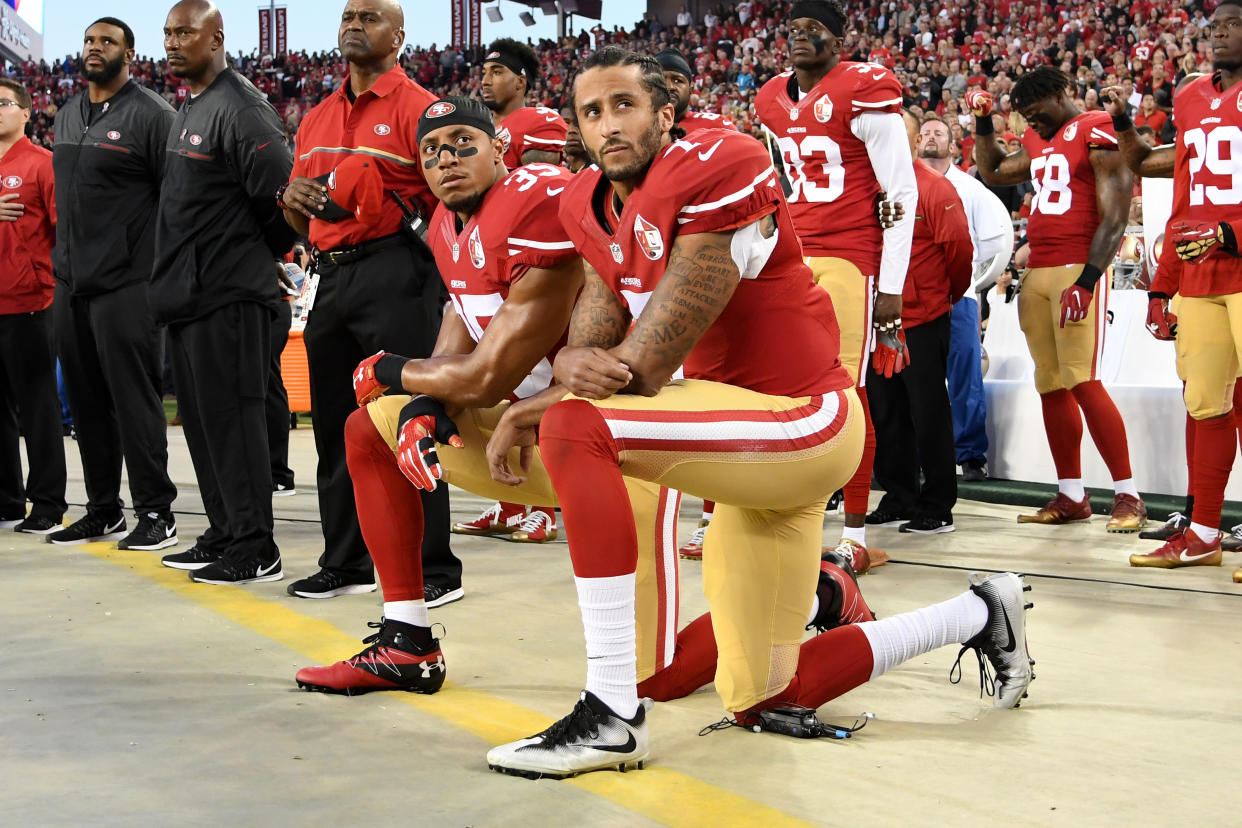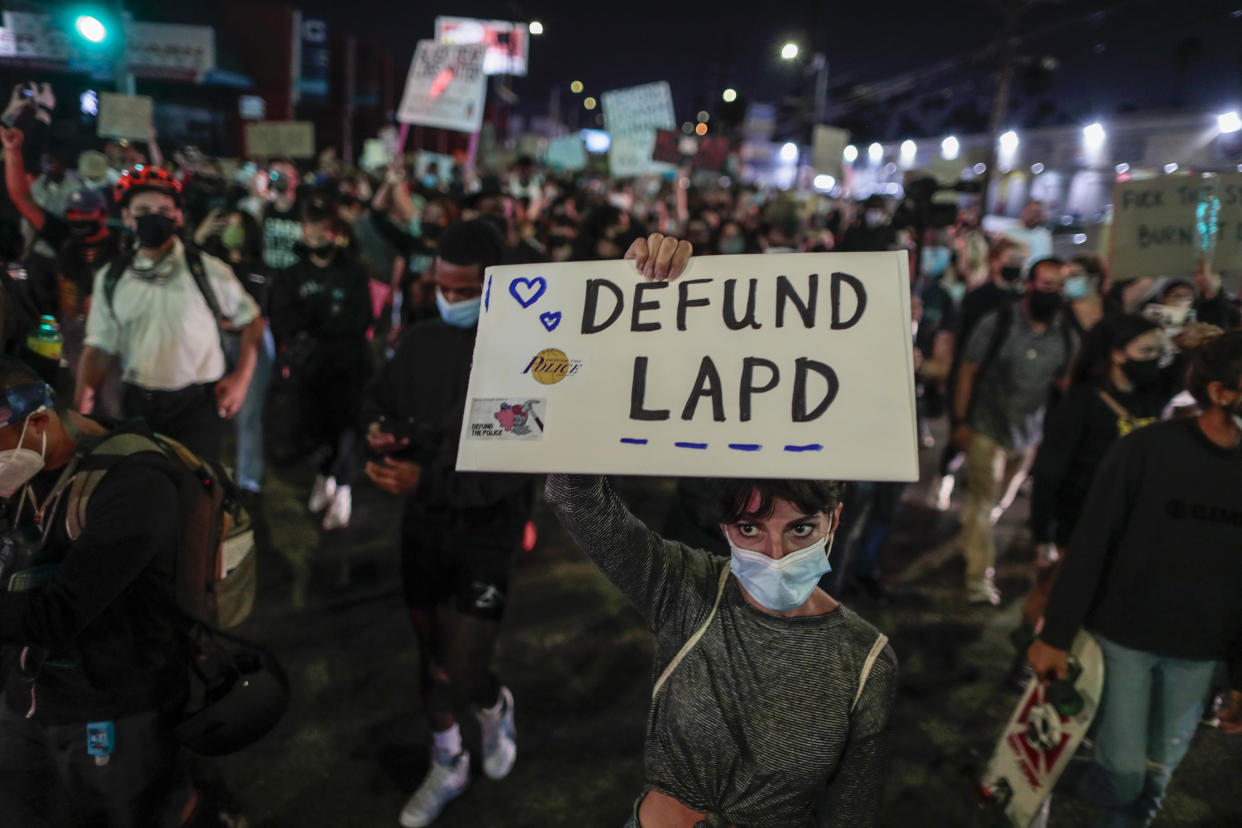Former LAPD commander has no regrets about taking a knee with George Floyd protesters: 'I would never undo it'
Despite receiving hate mail from his fellow officers, former Los Angeles Police Department Cmdr. Cory Palka says he has no regrets about his decision last year to take a knee with protesters following the death of George Floyd.
“It was one of the better moments of leadership in my career,” said Palka, who retired from the force on March 1, told Yahoo News. “To stand with our community in solidarity. I would never undo it. It was a great moment.”
The decision to pay tribute to Floyd and those demonstrating his brutal killing beneath the knee of a Minneapolis police officer occurred on the spur of the moment, Palka said. Late in the afternoon on June 1, 2020, a massive crowd of agitated protesters had assembled outside the Laugh Factory in Hollywood. With a citywide 6 p.m. curfew looming and orders to break up the demonstration, hundreds of police officers were deployed to the scene.

“The city was at a tipping point. The city was in crisis,” said Palka, a 34-year veteran of the LAPD who decided that the best way to defuse the threat of violence was to talk with the protesters.
His fellow officers, however, warned against approaching the seething crowd that had gathered on Sunset Boulevard.
“Don’t go in there because you’re going to get hurt,’” he recalled being told. “‘[We’re] going to have to pull you out if you go in there and talk to that group.’”
Cmdr. Palka stuck with his instincts. “I knew in my heart that I needed to give it my good-faith effort," he said.
He picked up a megaphone and made an unexpected offer to the protesters: If he took a knee in solidarity, would they promise to keep the rally peaceful? “Take a knee! Take a knee!” many of the cheering protesters chanted in response.
Palka surprised many people, including some of his fellow officers, by getting on one knee and bowing his head. One of the protesters reached out and shook his hand, thanking him. A few seconds later, Palka got back on his megaphone and said, “We stand together.” He then told protesters, “Within the next 30, 40 minutes, if you peacefully go out and return to where you came from, I give you my commitment and honor that you will not see police officers in front of you. Fair enough?”
An LAPD officer just took a knee with protesters in West Hollywood. The entire crowd took a knee with him. @LAPDHQ@ABC7pic.twitter.com/gRawsK0g6Y
— Veronica Miracle (@ABC7Veronica) June 1, 2020
Though the Los Angeles protest was being held just five days after Floyd’s death, when tensions between police and demonstrators were reaching a full boil, the majority of those who had gathered stayed true to their word and began clearing the area.
A few stragglers lingered beyond the curfew, some continuing to talk to Palka. “You can kind of go over that,” Palka told them about the curfew. “You’re OK with me.”
No protesters were injured. No police officers were put in harm’s way. Everyone involved went home safely.
Videos of him taking a knee with protesters circulated all over the internet. He drew cheers when he told the crowd, “We do not want to be your enemy. We do not want to go against you. We want to have a collaboration." He denounced the killing of George Floyd at the hands of Minneapolis police Officer Derek Chauvin and called it a murder. “[Chauvin] will face a justice system that will most likely find him guilty of this crime,” Palka told the Los Angeles Times. “It’s horrible conduct. It’s an embarrassment. That was terrible training and terrible application of common sense.”
During a peaceful protest in Hollywood on Monday denouncing the death of George Floyd at the hands of police, LAPD Cmdr. Cory Palka appealed to demonstrators for unity. Palka denounced the killing of Floyd as murder.
For more coverage of the protests: https://t.co/Yv7XPeptjypic.twitter.com/HxOfW2c6qQ— Los Angeles Times (@latimes) June 2, 2020
But even though Palka received plenty of support for his kneeling, one group gave him pushback — fellow cops.
Several formal complaints were filed against Palka over his actions on June 1, including one from a retired officer who accused Palka of being a “coward.”
The complaint from the retired officer said: “On June 1, 2020, Commander Palka, while on duty, inappropriately made a political statement while wearing his Department uniform when he kneeled with rioters.”
The complaint went on to say that Palka “demonstrated to the crowd that the Department had officially surrendered to them” and the act of kneeling “tarnished” the LAPD image.
“I’ve gotten hate mail from cops,” Palka said, adding, “Some of my friends have even turned away. But that has been a blessing, as it has given me peace and clarity.”
An internal review that concluded in February found that Palka's actions did not rise to the level of misconduct and his actions were deemed consistent with department policy. The internal report said Palka's decision to kneel was not made to make a political statement. Instead, Palka’s actions were made to de-escalate a situation that could have placed officer and civilian lives in danger if protesters became violent.

But the formal complaints and messages of hate from fellow officers — some of whom he had considered his closest friends — disappointed Palka.
Although many police officers supported Palka, the hardened attitudes of some cops against doing something as simple as taking a knee continue to mystify him.
“In the end, I’m a peacekeeper. We serve the community,” he said. “I have no regrets.”
Many social justice activists have praised police officers who have taken a knee or marched alongside protesters, saying it is an important step in bridging differences. But others don’t see it that way.
Kendrick Sampson, a Black Lives Matter organizer and star of the HBO show “Insecure,” called Palka’s gesture a “PR stunt,” while author and activist Roxane Gay wrote on Twitter, “I need cops and politicians and white people more broadly to stop kneeling. We don’t need you to kneel. We need you to stand up for real, radical, sustained change.”
Jury selection for the high-profile trial of former Minneapolis police Officer Derek Chauvin began on March 8 and will likely last for several weeks. The trial itself is set to begin on March 29. Chauvin is charged with second-degree murder and manslaughter in the death of George Floyd last Memorial Day. His defense lawyers likely will argue that Floyd's death was the result of his struggle with police and health issues.
Policing in America is one of the most polarizing issues facing the nation. The awareness of police brutality was dramatically heightened after San Francisco 49ers quarterback Colin Kaepernick knelt on the field as the national anthem played before the start of a preseason game between the 49ers and the Green Bay Packers in 2016.

Three years before Kaepernick took a knee, the Black Lives Matter movement was launched to shed light on incidents of police brutality and racially motivated attacks against African Americans. A pro-police group then started Blue Lives Matter as a countermovement to Black Lives Matter. The two worlds repeatedly collided in 2020 following the deaths of George Floyd, Ahmaud Arbery and Breonna Taylor. Their deaths, which were only months apart, sparked massive protests nationwide that lasted for months.
Rep. Ilhan Omar, D-Minn., was one of the loudest voices in the “Defund the Police” campaign. The Minnesota Democrat called for the total dismantling of the Minneapolis Police Department, saying that it couldn’t be reformed in its current state and that systematic change can only be achieved by removing the entire infrastructure. There were mounting calls from elected officials to defund police departments. Last December, L.A. city officials approved $150 million cuts to LAPD's budget forcing officers to be reassigned, and specialized programs were disbanded.
“No one is saying that the community is not going to be kept safe,” Omar told CNN. “Nobody is saying crime will not be investigated. No one is saying that we are not going to have a proper response when community members are in danger.”
She added: “What we are saying is the current infrastructure that exists as policing in our city should not exist anymore, and we can’t go about creating a different process with the same infrastructure in place.”
Palka says he believes the culture of policing has got to change, and that the system does need to be improved. But he said there has to be a smart plan to satisfy all sides. He also wants more accountability from elected officials, that they need to stop turning their backs on the very same cops who work night and day to keep their constituents safe.
"If a community could police itself regarding non-emergency issues, from traffic actions to neighbor disputes to handling natural death investigations to homeless issues, if the community or government could find alternatives to policing, then it’s only natural that you would reduce the number [of officers]. I think most police leaders would support that,” Palka suggested.

“The reality is that’s not happening,” he continued. “They want to defund the police and take money away from law enforcement with no actionable plan in place to take responsibilities away from law enforcement.”
Palka had planned to retire from the LAPD in early 2021 after signing a five-year contract with the city back in 2016. He leaves behind a department that continues to take a verbal beating from activists. He said much work is needed to restore the full faith of its residents and start the healing process from the wounds of the 2020 protests.
According to a recent USA Today/Ipsos poll, 54 percent of Black Americans said race relations in America got worse in 2020 compared with 10 percent said they had improved. For whites, 35 percent said race relations had gotten worse, while 13 percent said they had improved.
“Cops have done incredible work day in and day out,” Palka said. “But when a few go astray, which we have seen in this country, you can see the power and the level of anger and disappointment and it overshadows all the good we do every day.
“We’re not perfect. We’re human. We make mistakes,” he added. “For the most part, cops have good intentions and have good hearts. But sometimes, as you could see, it doesn’t work that way. Cops make mistakes but rarely are those mistakes intentional.”
____
Read more from Yahoo News:
